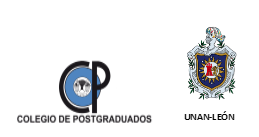Socio-productive and environmental characterization of the peñas blancas community, from the Municipality of Jinotega
DOI:
https://doi.org/10.5377/ribcc.v4i7.6307Keywords:
Characterization, Economic partner, Environmental, Peñas Blancas, FarmingAbstract
The present work gives us to understand the territorial dynamics, determining socio productive aspects, and environmental in the Community of Peñas Blanca, characterizing its current functioning within the community and at the level of farms or productive units, where, all this leads us to reflect and propose alternatives for change or development that adapt to the new agroclimatic conditions. On the one hand, to the determination of those particular attributes that a person or a thing presents and that therefore clearly distinguishes it. And on the other hand, at the request of the artistic world, especially in the fields of theater, cinema and television, the characterization of the adequacy of an actor in terms of physical features, making use of makeup and costumes, of the character he has played interpret The social aspects are of great interest to society because it provides improvements as well as in education, infrastructure, and technological services among others. Agriculture has been abundant due to abundant rainfall. Which most of the year it rains. The coffee industry generates employment and economy is the largest production of the municipality's farmers and also the basic grains. In the livestock is a second item that generates economy to producers. Silvopastoral systems and forage banks are implemented for livestock production. Biodiversity has been of great importance in the environment where part of the flora and fauna is provided forest parts, water resources.
Downloads
1920
HTML (Español (España)) 0
Published
How to Cite
License
Copyright (c) 2018 Rev. iberoam. bioecon. cambio clim.

This work is licensed under a Creative Commons Attribution-NonCommercial-ShareAlike 4.0 International License.
Copyright © Rev. iberoam. bioecon. climate change (Graduate School and UNAN-León, School of Agricultural and Veterinary Sciences / Department of Agroecology / Center for Research in Bioeconomy and Climate Cahnge (CRByCC).







